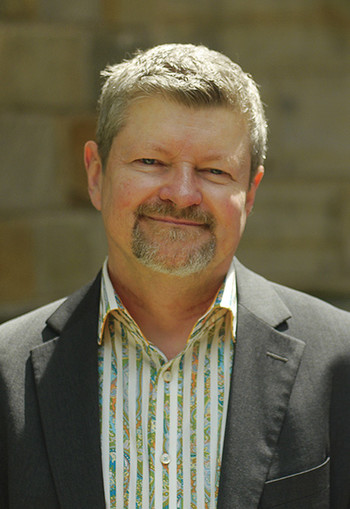Historian George Chauncey was first summoned to court in 1993. He was thirty-nine, a little-known assistant professor at the University of Chicago, and a year away from publishing his groundbreaking book Gay New York: Gender, Urban Culture, and the Making of the Gay Male World, 1890–1940. As one of a small number of scholars in the US working on gay history, Chauncey had been asked to testify in a case challenging a Colorado state constitutional amendment that banned municipalities from protecting gay people from discrimination.
The US Supreme Court ultimately struck down the amendment, and Chauncey became the go-to expert witness on the history of anti-gay discrimination.
Chauncey, who is the DeWitt Clinton Professor of American History at Columbia (a chair previously held by Allan Nevins ’60HON, Richard Hofstadter ’42GSAS, and Eric Foner ’63CC, ’69GSAS), has long been a witness for justice. He grew up in the 1950s and ’60s in the South, the son of a Presbyterian minister who was deeply involved in the civil-rights movement. By high school, Chauncey was eager to see other parts of the country, and when it came time for college he went to Yale, where he came out as gay. He got his PhD in history at Yale in the 1980s, at the height of the AIDS crisis.
Since the Colorado case, Chauncey has been involved as an expert witness in more than thirty gay-rights cases. When in 2003 the Supreme Court heard Lawrence v. Texas, which questioned the legality of state sodomy laws, Chauncey organized a group of historians to submit an amicus brief explaining why the historical rationale for the court’s previous defense of those laws was wrong. The justices agreed, ruling the laws unconstitutional.
With that victory, Chauncey figured his courtroom days were over. But in 2004, the commonwealth of Massachusetts legalized same-sex marriage. Court cases exploded, sparking a legal and social battle that would again pull the polite, gentle-spoken historian into the rough currents of a sea change. Chauncey became busier than ever, writing briefs and testifying widely about the history of anti-gay bias. In a 2011 affidavit for US v. Windsor, which contested the federal Defense of Marriage Act of 1996 (DOMA), Chauncey wrote that the most conspicuous legacy of twentieth-century discrimination could be found in the “numerous state statutes and constitutional amendments that brand gays and lesbians as second-class citizens by denying them the right to marry the person they love.” The court ruled that Section 3 of DOMA, which denied federal recognition, benefits, and protections to lesbian and gay couples married in states that allowed it, was unconstitutional.
The marriage issue came to a head in 2015, when the Supreme Court heard Obergefell v. Hodges, which challenged state bans on same-sex marriage. Chauncey — who a year earlier had married Ronald Gregg, now director of the MA program in film and media studies at the School of the Arts (they both came to Columbia from Yale in 2017) — wrote an amicus brief for the Organization of American Historians, again delineating the history of anti-gay repression. On June 26, 2015, the court declared the marriage prohibitions unconstitutional. “It was a stunning day,” says Chauncey. “Our brief was cited in the decision, which was extraordinary.” The historian was once again helping to craft history.
This year, the Library of Congress named Chauncey, sixty-eight, the winner of the 2022 John W. Kluge Prize for Achievement in the Study of Humanity. “His work that helped transform our nation’s attitudes and laws epitomizes the Kluge Center’s mission to support research at the intersection of the humanities and public policy,” said Librarian of Congress Carla Hayden ’22HON. Chauncey is the first recipient of the $500,000 international prize to be honored for work in LGBTQ+ studies.
But his joy at the achievement is tempered by concerns about the fragility of the rights that have been gained, given the tilt of today’s Supreme Court. “It’s still unclear where this court will go with marriage equality, and that’s chilling,” Chauncey says. “So many issues that were struggled over for decades and that seemed settled are now open again.”
For Chauncey, that is history’s unending lesson.
“What we learn from history is that we are always in a state of struggle, we are always in a state of flux,” he says. “We cannot take anything for granted.”
This article appears in the Fall 2022 print edition of Columbia Magazine with the title "When Historians Make History."



